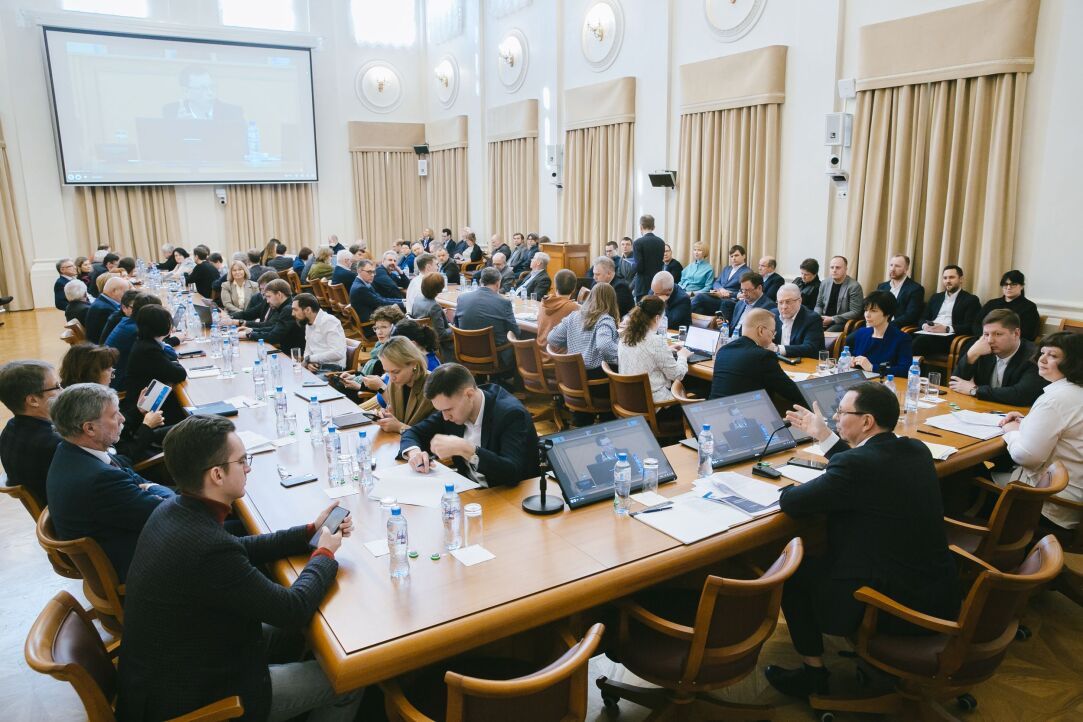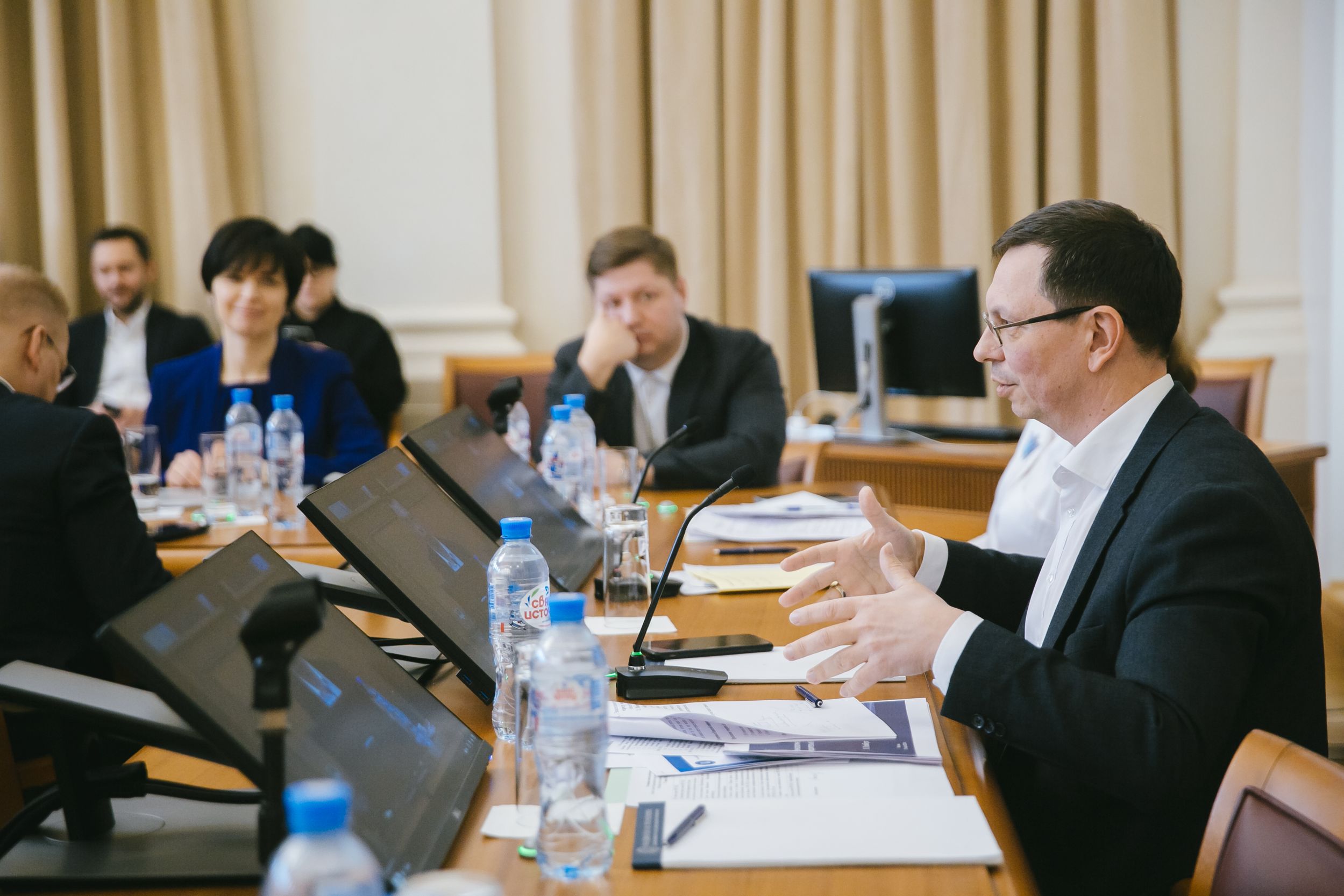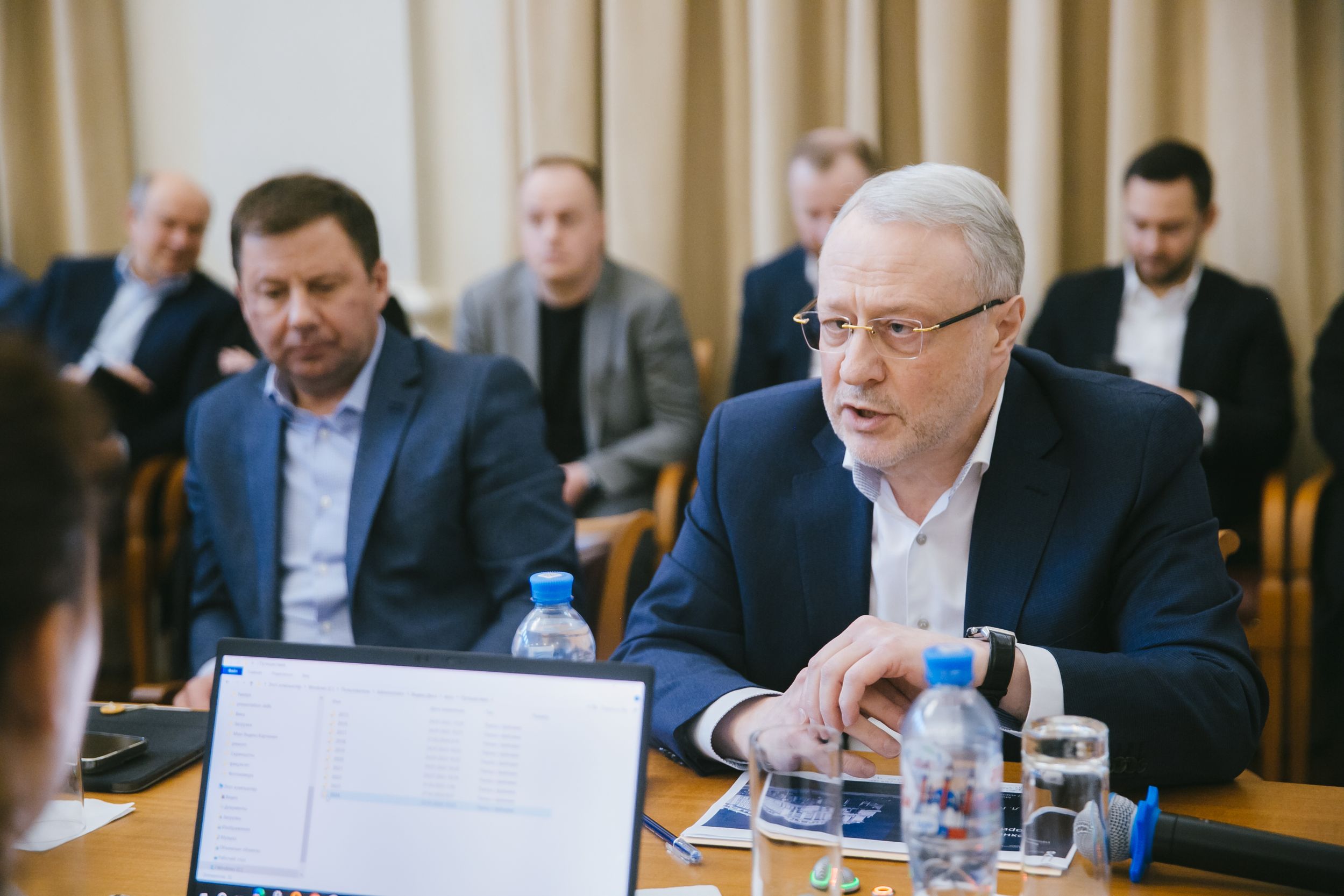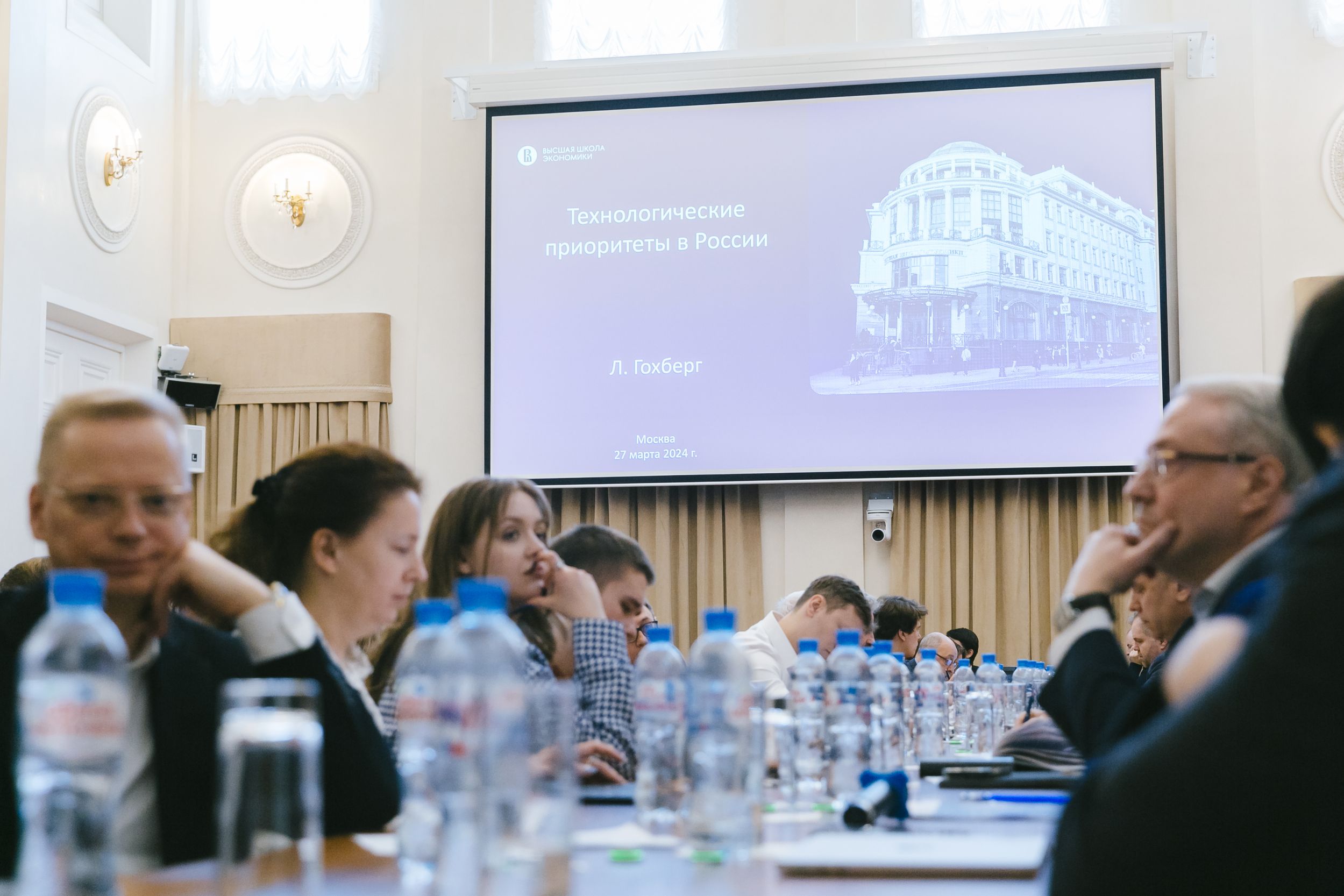Newly-Elected HSE Academic Council Examines National Technological Priorities

On March 27, 2024 the first meeting of the newly-elected HSE Academic Council was held. The meeting approved the list and composition of commissions responsible for the preliminary consideration of issues prior to their inclusion in the Council’s agenda. The attendees also discussed Russia's technological priorities and outlined ways for university staff members to participate in addressing technological development challenges.
HSE Rector Nikita Anisimov opened the meeting and took a moment to remind everyone of the tragedy that occurred last week at the Crocus City Hall. He noted that students and staff members from HSE University were present during the tragic incident—all of whom are alive, and some of them have received psychological assistance. The HSE Situation Centre started operating immediately after the terrorist attack. The members of the Academic Council honoured the memory of the victims with a minute of silence.

The meeting also marked the final formation of the new Academic Council, during which the rector signed the relevant order.
The Academic Council includes 135 members. 87 of them were elected at the HSE Staff and Student Conference, which took place on March 19, 2024, at Russia Expo; 20 were included by virtue of their positions within the HSE University Administration, and 28 were recommended by the Rector. The council includes campus directors, deans, the Director of the HSE Lyceum, and, for the first time, students.
The Academic Council has been renewed, with 67 individuals from its previous composition retained. Nikita Anisimov stressed that maintaining continuity is a crucial aspect of the council's operations.
During the meeting, the council ratified the list and structure of its commissions, which conduct preliminary consideration of issues before they are added to the agenda. The commissions can be either permanent or temporary, and over the last five years, they have deliberated on 2,298 issues. Members of the Academic Council had the opportunity to join multiple commissions based on their interests, with the commission on organising scientific research emerging as the most sought-after.
Leonid Gokhberg, First Vice Rector and Director of the HSE Institute for Statistical Studies and Economics of Knowledge, presented a report on Russia's new technological priorities. Based on this information, university staff members can outline objectives for their further endeavours.

‘The priority is still given to fundamental research, with an emphasis on practical results with a high level of technological maturity, which are in demand by the economy, the state, and society. This applies not only to technology-related departments of HSE University, but also to all aspects of our scientific agenda,’ emphasised Leonid Gokhberg.
He explained that the main vectors in this area are determined by the Concept of Technological Development of Russia until 2030, which was adopted last year.
Leonid Gokhberg highlighted projects related to technological sovereignty, including the localisation of aircraft, unmanned aviation systems, medicines, medical products, and more. These are full-cycle projects—from research to technological developments and product solutions, offering avenues for HSE University's participation.

This year marks the conclusion of the national programme ‘Digital Economy of the Russian Federation’, during which HSE University intensified its research and development in AI. It is set to be succeeded by the national project ‘Data Economy.’ This new project will continue to support research centres specialising in AI, offering scholarships for students and postgraduates, preferential access to computing resources, and more. Therefore, HSE University teams should be prepared to engage with it.
In final part of his presentation, Leonid Gokhberg assessed the dynamics of HSE University's publications in the field of AI. In terms of the number of publications in international journals, the university holds the top position in Russia, with about 40% of these publications presented at the most prestigious A* conferences, a milestone achieved in a remarkably short period.
‘We cannot rest on our laurels, aware that these leading positions might be surpassed tomorrow. The competition is intense, which demands from us a proactive approach, a focused effort, and a shift towards applied solutions,’ Leonid Gokhberg concluded.
See also:
New Academic Council to Be Formed at HSE University in March
On February 28, 2024, HSE University's Academic Council held the final meeting with its current members: their term of office is expiring. On March 19, HSE University will host a conference for its employees and students, at which elections will take place, and, by the end of the month, a new composition of the Academic Council will be formed for a five-year term.
‘University Life in Partnership with Artificial Intelligence’
HSE University is one of the leaders in IT education and research in the field of artificial intelligence (AI). Thanks to this, the university recently received the highest grant of the Priority 2030 programme. The integration of AI technologies into education is set to become a strategic direction for the university’s development over the next five years. What changes are coming to HSE University in this regard and how they will affect students and teachers? These issues were discussed at a meeting of HSE University’s Academic Council on December 20.
Academic Council: HSE University’s Contribution to Achieving National Goals and Development Priorities to Increase
HSE University’s Development Programme until 2030 will be improved in order to increase the university’s contribution to achieving national goals and implementing the priorities of the country’s scientific and technological development. This decision was made by the university’s Academic Council on April 26. The meeting also addressed the principles for the development of HSE University’s external communications, one of which is the creation of a high-quality information field around the university.
Development of Faculty of Creative Industries Discussed at HSE Academic Council Meeting
On March 1, the HSE University Academic Council held a meeting at the building on Pokrovsky Bulvar. The main focus of the meeting was the development of the Faculty of Creative Industries. A secret ballot was also held for the competition to fill faculty positions.
HSE Academic Council Sums Up the Results of Admission Campaign
For the first time, HSE University has moved up to second place based on the average score of applicants enroled on state-funded bachelor's programmes. The implementation of the concept of ‘four campuses — one university’ has led to an increase in the number of applicants and the quality of admissions at the regional campuses. As well as this, enrolment on online programmes has increased by more than 50%. Despite a slight reduction in the number of international applicants due to external factors, the university has maintained its rigorous selection policy for prospective students. Among foreign countries, China has the largest number of students applying for HSE’s master’s programmes.
HSE Academic Council Meets for the Last Time This Academic Year
The meeting was held in person for the first time in over two years. It was attended by Sergey Kravtsov, Russian Minister of Education, and Dmitry Smyslov, Vice President of VK. The Council discussed HSE University’s breakthrough projects in engineering and artificial intelligence and elected new distinguished and tenured professors.
HSE Launches New International Laboratories
On February 28, 2014, the HSE Academic Council approved the creation of a number of new international laboratories at the university.
Academic Council: New Departments and Achievements
On June 29th 2012, the latest regular session of the Higher School of Economics Academic Council took place at the HSE. The agenda included information on the launch of new faculties and departments, approval of certain regulatory documents, as well as the results of the voting process for the teaching staff competition.
‘The Expansion of The University Sets Some New Limitations And New Development Tasks’
On November 25th the Academic Council of the Higher School of Economics summarized the university’s work over the last year.
Awards and New Areas of Development
On October 28th 2011, a session of the Academic Council of the Higher School of Economics took place at the HSE, The event began with an award ceremony: Claude Blanchemaison, Professor at the Paris-Dauphine University, former French Ambassador in Russia and a long-time friend of the HSE, was given the title of HSE Honorary Professor.


